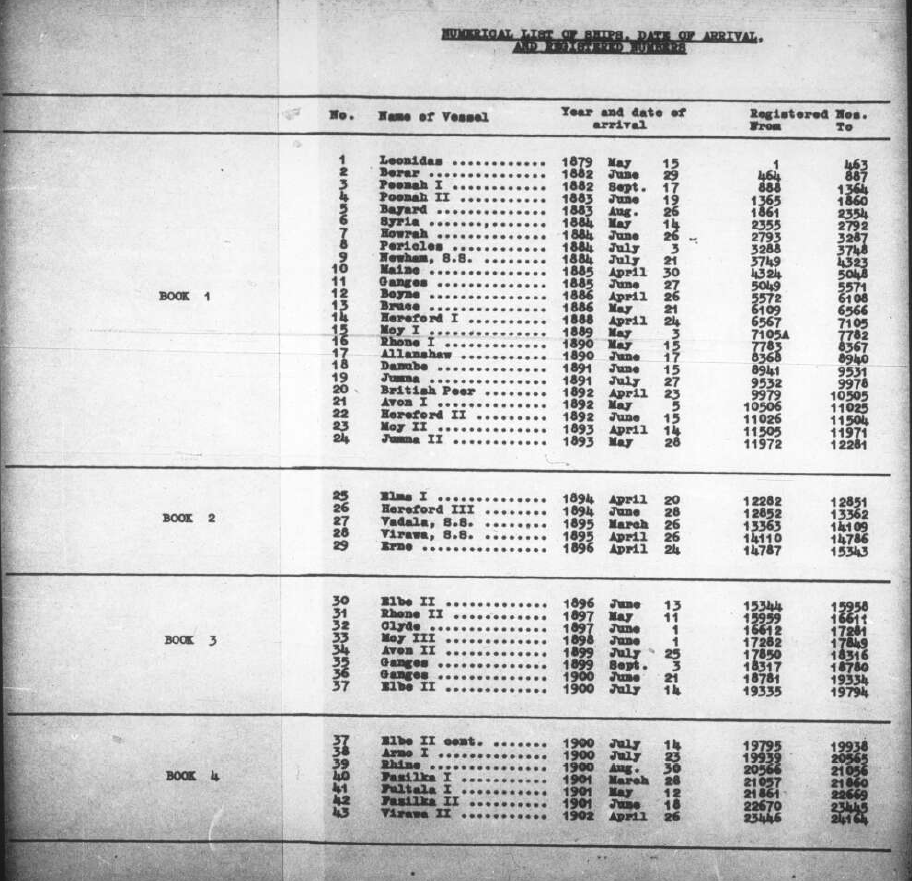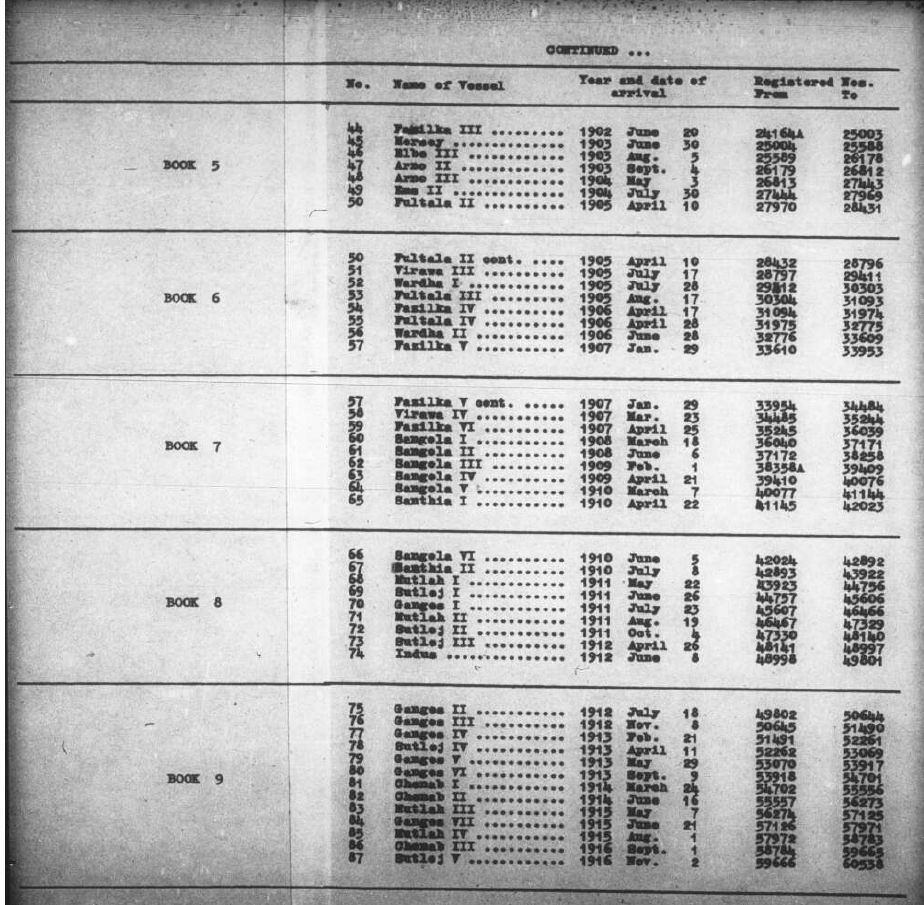| Name of Ship | Date of Arrival | Registered Numbers | Number of Arrivals |
| Leonidas | May 15, 1879 | 1–463 | 463 |
| Berar | June 29, 1882 | 464–887 | 424 |
| Poonah | September 17, 1882 | 888–1364 | 477 |
| Poonah | June 19, 1883 | 1365–1860 | 496 |
| Bayard | August 20, 1883 | 1861–2354 | 494 |
| Syria | May 14, 1884 | 2355–2792 | 438 |
| Howrah | June 26, 1884 | 2793–3287 | 495 |
| Pericles | July 3, 1884 | 3288–3748 | 461 |
| SS Newnham | July 23, 1884 | 3749–4323 | 575 |
| Main | April 30, 1885 | 4324–5048 | 725 |
| Ganges | June 27, 1885 | 5049–5571 | 523 |
| Boyne | April 26, 1886 | 5572–6108 | 537 |
| Bruce | May 21, 1886 | 6109–6566 | 458 |
| Hereford | April 24, 1888 | 6567–7105 | 539 |
| Moy | May 3, 1889 | 7106–7782 | 677 |
| Rhone | May 15, 1890 | 7783–8367 | 585 |
| Allan Shaw | June 17, 1890 | 8368–8940 | 573 |
| Danube | June 15, 1891 | 8941–9531 | 591 |
| Jumna | June 27, 1891 | 9532–9978 | 447 |
| British Peer | April 23, 1892 | 9979–10505 | 527 |
| Avon | May 5, 1892 | 10506–11025 | 520 |
| Hereford | June 15, 1892 | 11026–11504 | 479 |
| Moy | April 14, 1893 | 11505–11971 | 467 |
| Jumna | May 23, 1893 | 11972–12281 | 310 |
| Ems | April 20, 1894 | 12282–12851 | 570 |
| Hereford | June 28, 1894 | 12852–13362 | 511 |
| SS Vadala | March 26, 1895 | 13363–14109 | 747 |
| SS Virawa | April 26, 1895 | 14110–14786 | 677 |
| Erne | April 24, 1896 | 14787–15343 | 557 |
| Elbe | June 13, 1896 | 15344–15958 | 615 |
| Rhone | May 11, 1897 | 15959–16611 | 653 |
| Clyde | June 1, 1897 | 16612–17281 | 670 |
| Moy | June 1, 1898 | 17282–17849 | 568 |
| Avon | July 25, 1899 | 17850–18316 | 467 |
| Ganges | September 3, 1899 | 18317–18780 | 464 |
| Ganges | June 21, 1900 | 18781–19334 | 554 |
| Elbe | July 26, 1900 | 19335–19938 | 604 |
| Arno | July 23, 1900 | 19939–20565 | 627 |
| Rhine | August 30, 1900 | 20566–21056 | 491 |
| SS Fazilka | March 28, 1901 | 21057–21860 | 804 |
| SS Fultala | May 12, 1901 | 21861–22669 | 809 |
| SS Fazilka | June 18, 1901 | 22670–23445 | 776 |
| SS Virawa | April 26, 1902 | 23446–24163 | 718 |
| SS Fazilka | June 20, 1902 | 24164–25003 | 840 |
| Mersey | June 13, 1903 | 25004–25588 | 585 |
| Elbe | August 5, 1903 | 25589–26178 | 590 |
| Arno | September 4, 1903 | 26179–26812 | 634 |
| Arno | May 3, 1904 | 26813–27443 | 631 |
| Ems | July 30, 1904 | 27444–27969 | 526 |
| SS Fultala | April 10, 1905 | 27970–28796 | 827 |
| SS Virawa | July 17, 1905 | 28797–29411 | 615 |
| SS Wardha | July 28, 1905 | 29412–30303 | 892 |
| SS Fultala | August 17, 1905 | 30304–31093 | 790 |
| SS Fazilka | April 17, 1906 | 31094–31974 | 881 |
| SS Fultala | April 28, 1906 | 31975–32775 | 801 |
| SS Wardha | June 28, 1906 | 32776–33609 | 834 |
| SS Fazilka | January 28, 1907 | 33610–34484 | 875 |
| SS Virawa | March 23, 1907 | 34485–35243 | 759 |
| SS Fazilka | April 25, 1907 | 35244–36039 | 796 |
| SS Sangola | March 18, 1908 | 36040–37171 | 1132 |
| SS Sangola | June 6, 1908 | 37172–38257 | 1086 |
| SS Sangola | February 1, 1909 | 38258–39409 | 1152 |
| SS Sangola | April 21, 1909 | 39410–40076 | 667 |
| SS Sangola | March 7, 1910 | 40077–41002 | 926 |
| SS Santhia | April 22, 1910 | 41003–42023 | 1021 |
| SS Sangola | June 5, 1910 | 42024–42892 | 869 |
| SS Santhia | July 8, 1910 | 42893–43922 | 1030 |
| SS Mutlah | May 22, 1911 | 43923–44756 | 834 |
| SS Sutlej | June 25, 1911 | 44757–45606 | 850 |
| SS Ganges | July 22, 1911 | 45607–46466 | 860 |
| SS Mutlah | August 18, 1911 | 46467–47329 | 863 |
| SS Sutlej | October 4, 1911 | 47330–48140 | 811 |
| SS Sutlej | April 27, 1912 | 48141–48997 | 857 |
| SS Indus | June 8, 1912 | 48998–49801 | 804 |
| SS Ganges | July 18, 1912 | 49802–50644 | 843 |
| SS Ganges | November 8, 1912 | 50645–51490 | 846 |
| SS Ganges | February 21, 1913 | 51491–52261 | 771 |
| SS Sutlej | April 11, 1913 | 52262–53069 | 808 |
| SS Ganges | May 29, 1913 | 53070–53917 | 848 |
| SS Ganges | September 9, 1913 | 53918–54701 | 784 |
| SS Chenab | March 24, 1914 | 54702–55556 | 855 |
| SS Chenab | June 16, 1914 | 55557–56273 | 717 |
| SS Mutlah | May 7, 1915 | 56274–57125 | 852 |
| SS Ganges | June 21, 1915 | 57126–57971 | 846 |
| SS Mutlah | August 1, 1915 | 57972–58783 | 812 |
| SS Chenab | September 1, 1916 | 58784–59665 | 882 |
| SS Sutlej | November 11, 1916 | 59666–60553 | 888 |


